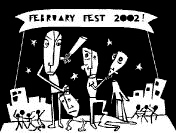LAST WEEK, at least 60 reporters and other wielders of symbolic megaphones crowded into the mayor’s conference room to hear Paul Schell and various task force representatives unveil the city’s assessment of what needs to be done to avoid repeating last February’s ugly Mardi Gras riots. After the presentations, the questioning was pointed. It echoed the aggressiveness of the Seattle Police Department’s Mardi Gras after-action report, released the previous night: Shouldn’t event organizers be held responsible for violence? What about stiffer sanctions against law-breakers? And so on.
The city wants Mardi Gras to morph into something silly called February Fest, as though what we all pine for is another Bumbershoot or block party when it’s 45 degrees, dark, and raining. Between the police and the task forces, we didn’t learn much. We knew that, just like with the WTO, the SPD would decide that it should attack citizens with less provocation next time. We knew that the city would discover that good planning is better than bad planning(!). And so on.
To be fair, within the scopes that the various task forces considered, they covered a lot of ground. But they all boiled down to the very liberal Seattle conviction that we need more government involvement when the public wants to get together, and, when youth are troubled, we need to throw lots of money at new programs for them.
This was both predictable and irrelevant. The Mardi Gras violence would never have become a lasting public issue—would have been indistinguishable from any of a half-dozen other rowdy civic affairs—had cops not held back even when violent crimes were being committed right in front of them. Any discussion of “preventing it from happening again” begins and ends there; the rest is window dressing that may make the event better, safer, and more inclusive in the future, but its absence isn’t what cost Kris Kime his life.
Rowdy events, and troubled and violent kids, existed in Seattle long before Mardi Gras 2001, and bureaucracies are always swearing allegiance to some bold new restructuring scheme or another. But the most pivotal aspect of the Mardi Gras riots for Seattle’s future wasn’t even mentioned in all of last week’s verbiage.
DON’T MENTION RACE
I’d wager that if asked to select one word they associate with this tragedy, most people would choose “race.” And civic Seattle can’t even bring itself to utter the word. It’s pathetic.
Of last week’s five city-issued reports, only the Youth Safety Task Force’s final report even discusses race in passing. And that’s only to insist that Mardi Gras was not a race riot, trotting out the various police reports and witness accounts that not all attackers were black and not all victims were white. This is—despite certain residual ravings—undeniably true. And it doesn’t matter.
Far more important, and also undeniably true, is that much of the violence was black-on-white; that some of it was fueled, in part, by racial resentments; and, most critically, that the images of black-on-white violence flooding local media ripped open racial resentments that have only been compounded by subsequent local events.
The SPD’s inaction was a policy decision on one night and carries very little significance for future Seattle policy. But the racial wounds are much greater. Mindy Cameron, from her new home in the multicultural bastion of Northern Idaho, declared in a recent Seattle Times column that she thought Seattle really could have an honest conversation about race. Maybe so, but it’s sure not getting much help from its alleged leaders. To pretend that white folks are going to forget about Mardi Gras 2001 because it will be replaced by February Fest, or that nonwhites won’t remember the viciousness of some of the bigotry and racial stereotyping that followed, is pure folly.
It’s also exactly why Seattle is such an economically, socially, and politically segregated city. For generations, Seattle has swept race issues into the South End and under the rug, preferably never to be seen again. “Why, we’re an incredibly diverse city! We even elected Norm Rice as mayor! Twice!” After Mardi Gras, Aaron Roberts, the attack on Paul Schell, and the Asian-American jaywalkers, nobody is claiming any longer that there’s no problem.
Instead, apparently, they’re not claiming anything, hoping that ignoring race issues will help them die down and eventually go away again.
That’s exactly the problem. Race in Seattle is compounded by, among other things, divisions of age, class, and gender. Few people are talking, let alone listening, across those lines. If the point of all of these after-catastrophe reports is to prevent what happened at Mardi Gras from happening again, nothing could possibly have been more germane, and effective, than initiating efforts to bridge Seattle’s racial rifts. The omission of this is a failure in leadership that shows an inexcusable lack of awareness of the chasms dividing our city.







